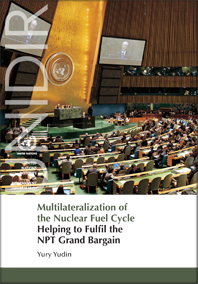The spread of sensitive fuel-cycle technologies exacerbates tensions between the pillars of the Treaty on the Non-Proliferation of Nuclear Weapons, non-proliferation, the peaceful use of nuclear energy, and disarmament. The heart of the problem is the way in which nuclear technology is typically managed, namely the highly national control of nuclear activities. Multilateralization of the nuclear fuel cycle could provide all states with non-discriminatory access to "the benefits of peaceful applications of nuclear technology" while barring direct access to weapon-usable nuclear material. This study examines one aspect of the nuclear disarmament puzzle: the risks fuel-cycle technologies could pose to the viability of a world without nuclear weapons and what could be done to mitigate those risks
Citation: Yury Yudin (2010). "Multilateralization of the Nuclear Fuel Cycle: Helping to Fulfil the NPT Grand Bargain", UNIDIR, Geneva.
